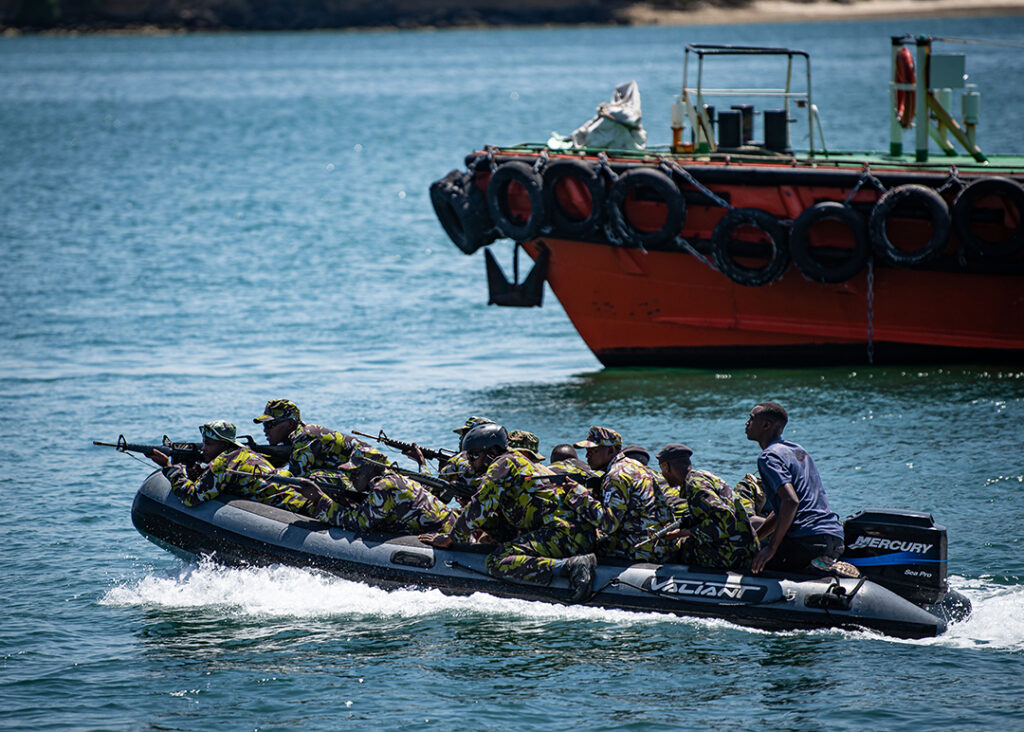ADF STAFF
Illegal, unreported and unregulated (IUU) fishing in Kenya has declined significantly since the country established a Coast Guard in 2018.
That is according to Timothy Wamalwa, an operator in the Kenyan Coast Guard, who credited international maritime security exercises such as Cutlass Express with helping enhance the country’s maritime domain awareness and security efforts.
Joint training with the U.S. Coast Guard on small boat operations “was a plus to our knowledge and handling of boats at sea,” Wamalwa said of Cutlass Express 2023 (CE23), which ended March 17.
The 11-day exercise based in Djibouti, Kenya and Mauritius was sponsored by U.S. Africa Command and led by U.S. Naval Forces Africa. Participating nations included Canada, Comoros, Djibouti, France, Georgia, Greece, Kenya, Madagascar, Mauritius, Mozambique, Seychelles, Tanzania and the United Kingdom.
Before Kenya formed its coast guard, Wamalwa, a former corporal in the Kenyan Navy, said foreign fishing vessels routinely fished illegally in the country’s waters for decades, threatening the livelihoods of artisanal fishermen and decimating fish stocks.
“We’d lose a lot of revenue, and it had become almost normal for anyone to come into our territorial waters, fish them, and then go,” Wamalwa said. “For the local fisherman, they rely on the same resource. They had this feeling that they were being deprived of what was theirs. It was illegal, but there was no security organ that could enforce that law.”
Throughout CE23, participants trained in tactical combat casualty care, marksmanship, at-sea maneuvers, mine countermeasures and close-combat techniques, as well as legal instruction. All are important skills for naval forces to hone while operating in a region beleaguered by a litany of sea crimes, including piracy, oil theft, and human, weapons and drug trafficking.
At the Bandari Maritime Academy in Mombasa, Kenya, exercise participants sharpened skills pertaining to crime scene management, water survival, boarding techniques, detainee handling and document inspection.
CE23 participants also received SeaVision training. A maritime domain awareness tool, SeaVision helps professionals in an operations center track vessels at sea. Created in 2012 by the U.S., this tool is used by about 25 African countries to monitor their waters.
Wamalwa said the exercise “cut across all aspects of security, safety and the legal sphere as well.”
“It really helps when we’re out there conducting operations,” he said. “Now we know what to do, who to report to, how to share information, and with exercises like this in place we’ll definitely continue to build the capacity of the [East African] states, inasmuch as how to deal with illicit activity at sea. It’s an eye-opener to the participants, and going forward, I’m sure we’re going to execute our missions better than we have in the past.”
CE23 was linked with U.S. Naval Forces Central Command’s International Maritime Exercise (IMX). The Middle East region’s largest maritime security exercise, IMX involved 7,000 participants from more than 50 nations. It focused on maritime security cooperation, mine countermeasures, unmanned systems and artificial intelligence integration.
In the Gulf of Aqaba, participants simulated a ship-to-shore patient transfer using an unmanned surface vessel. It transported a mannequin from a crewed vessel to land, marking the first time a drone was used during medical evacuation training.
“I’ve learned a lot in the decision-making process, especially through multiple training situations that happened at the same time,” Egyptian Navy Cmdr. Mohamed Gharbyia said as the event closed. “It made me think outside the box.”

